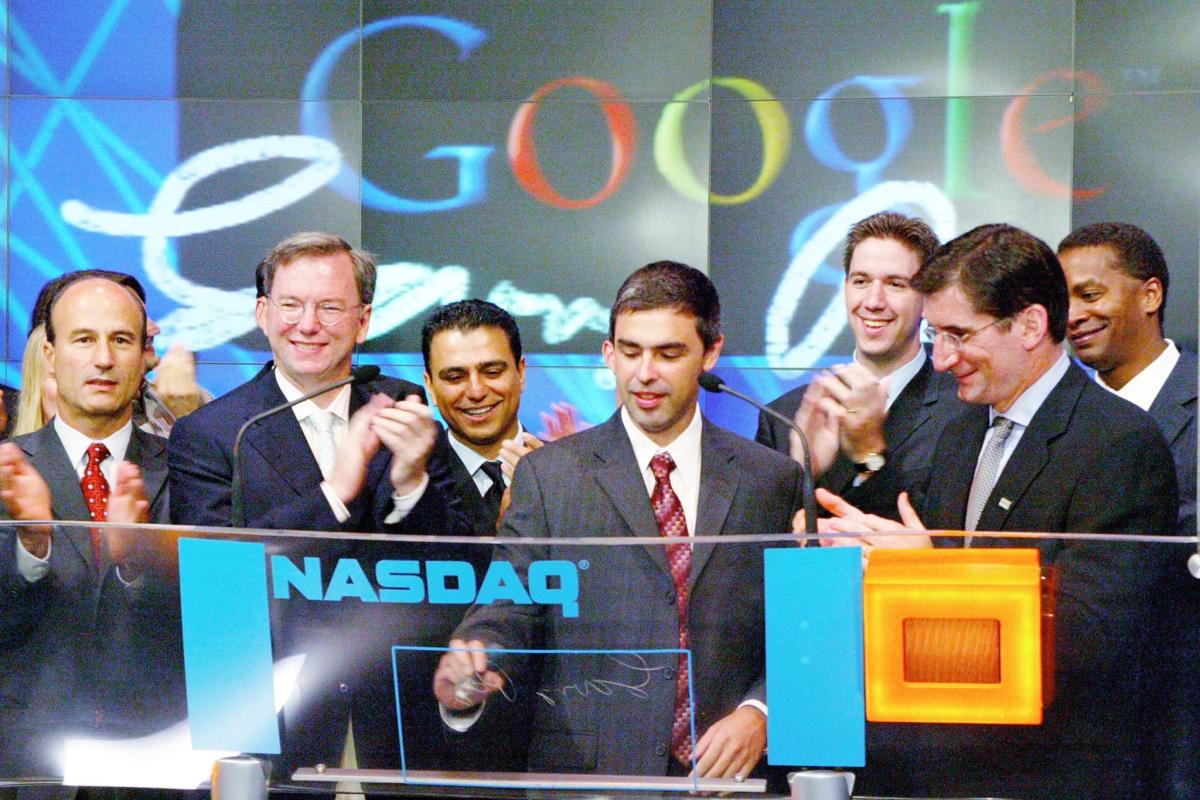Back in 2004, Google’s 31-year-old cofounders, Larry Page and Sergey Brin, were Silicon Valley darlings who graced the covers of Newsweek, Time, and of course, Fortune (not to mention an interview for Playboy). Their decision to take public their startup—whose motto at the time was “Don’t Be Evil”—was one of the year’s biggest tech and business stories.
The public offering, which took the form of an unconventional Dutch auction, came just six years after the cofounders created Google in their Stanford dorm rooms. Less than six months later, the company had turned into a “$2 billion growth machine,” then Fortune-staffer Fred Vogelstein wrote in a December 2004 cover story. Despite the stock trading at 65 times earnings, most investors remained bullish.
“Just don’t bet the rent money on it,” Vogelstein advised readers. If they did anyway, it would have turned out just fine.
Monday marked the 20-year anniversary of Google’s IPO. The stock has appreciated over 6,500% since then.
In other words, if you invested $1,000 in Google at its closing price on Aug. 19, 2004, your shares of Alphabet, now the search giant’s parent, would have been worth $66,521.70 as of Monday’s close. After two decades and a pair of stock splits, Alphabet reclaimed its spot in the $2 trillion market cap club in April and is the fourth-largest company in the U.S.
View this interactive chart on Fortune.com
Google seeks to extend two decades of dominance
Now one of the most powerful companies in the world, Google embraced its startup culture when going public and chose an unconventional method that enraged many on Wall Street. Google decided on a so-called Dutch IPO—when a company collects bids from all interested investors and then opens at the highest price at which it could sell all its shares—to limit underpricing. Six years later, then-CEO Eric Schmidt wrote in Harvard Business Review that Google wanted to avoid the early “pop” that allowed institutional investors to quickly flip their shares. Google felt that money should belong to the company.
“We wanted something much more transparent and open,” Schmidt wrote, “and we wanted our users to have a chance to take part.”
The regulatory road was rocky, and media criticism was widespread. When bidding began, Google’s expected IPO price range was $106 to $135 per share. In the end, the company agreed to price it at $85 per share.
Then the day finally came, and, ironically, the stock kept on rising. It closed its first day at $100.30.
Monday’s IPO anniversary also came with a somber note, though. The company is mourning the loss of one its most important leaders, Susan Wojcicki, the former CEO of YouTube, who died at age 56 earlier this month and whose sister married Brin (the pair divorced in 2015).
Wojcicki rented her Palo Alto garage to Page and Brin during the company’s early days, joining Google as its first marketing manager in 1999 and helping oversee its ad and video business over more than two decades. Her legacy is apparent—and underlined by Alphabet’s hold on daily life.
Google controls over 90% of the global search market. The company raked in over $328 billion in revenue during the previous 12 months ending June 30, representing 13.4% year-on-year growth. Gross profit margins are approaching 60%.
It’s also swimming in more than $30 billion in free cash flow, allowing Alphabet to make the heavy investments necessary to stay afloat in the AI arms race.
But regulatory pressures loom as Big Tech remains in the government’s crosshairs. Earlier this month, a federal judge ruled that Alphabet had illegally monopolized the search market, the first major antirust loss for Big Tech in almost two decades. That could be just the tip of the iceberg, with the Justice Department reportedly considering whether to pursue a breakup of the company.
Still, the government has experienced more setbacks than success in going after the tech giants, Itay Goldstein, the finance department chair at the University of Pennsylvania’s Wharton School, told Fortune. Currently, the dominance of Alphabet and its peers remains intact.
“At some point, I think it will be challenged,” he said, “and we will see some major reckoning.”
For Google, there’s also the prospect of new competition, headlined by OpenAI launching its own search engine. While Bank of America analysts are concerned about a potential Apple-OpenAI search partnership, they continue to have high hopes for the stock.
“We believe Alphabet has data, technology, distribution, and financial advantages that will likely help mitigate new competitive threats,” BofA’s Justin Post and Nitin Bansal wrote in a recent note.
If that proves true, maybe the stock can reward investors for another 20 years.
This story was originally featured on Fortune.com

